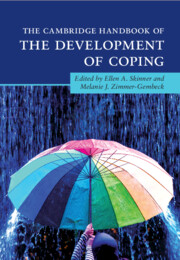Book contents
- The Cambridge Handbook of the Development of Coping
- Cambridge Handbooks in Psychology
- The Cambridge Handbook of the Development of Coping
- Copyright page
- Contents
- Contributors
- Preface
- 1 A Systems Perspective on the Development of Coping
- Part I Theoretical Perspectives on the Development of Coping
- Part II Methods for Studying the Development of Coping
- Part III Neurophysiological and Experiential Bases of the Development of Coping
- Part IV Psychological Foundations of the Development of Coping
- Part V Social Contexts and the Development of Coping
- 17 Coping Development as an Everyday Interpersonal Process
- 18 Parenting, Socialization of Emotion, and the Development of Coping
- 19 Temperament, Family Context, and the Development of Coping
- 20 Interparental Conflict, Parental Relationship Dissolution, and the Development of Children’s Coping
- 21 Autonomy, Self-Determination, and the Development of Coping in Adolescence
- 22 Peer Stressors and Peer Relationship Dynamics in the Development of Coping
- 23 Income, Income Inequality, Community, and the Development of Coping
- 24 Culture, Diversity, Context, and the Development of Coping
- Part VI Application and the Development of Coping
- Index
- References
19 - Temperament, Family Context, and the Development of Coping
from Part V - Social Contexts and the Development of Coping
Published online by Cambridge University Press: 22 June 2023
- The Cambridge Handbook of the Development of Coping
- Cambridge Handbooks in Psychology
- The Cambridge Handbook of the Development of Coping
- Copyright page
- Contents
- Contributors
- Preface
- 1 A Systems Perspective on the Development of Coping
- Part I Theoretical Perspectives on the Development of Coping
- Part II Methods for Studying the Development of Coping
- Part III Neurophysiological and Experiential Bases of the Development of Coping
- Part IV Psychological Foundations of the Development of Coping
- Part V Social Contexts and the Development of Coping
- 17 Coping Development as an Everyday Interpersonal Process
- 18 Parenting, Socialization of Emotion, and the Development of Coping
- 19 Temperament, Family Context, and the Development of Coping
- 20 Interparental Conflict, Parental Relationship Dissolution, and the Development of Children’s Coping
- 21 Autonomy, Self-Determination, and the Development of Coping in Adolescence
- 22 Peer Stressors and Peer Relationship Dynamics in the Development of Coping
- 23 Income, Income Inequality, Community, and the Development of Coping
- 24 Culture, Diversity, Context, and the Development of Coping
- Part VI Application and the Development of Coping
- Index
- References
Summary
We present a model and review research supporting the proposal that children’s temperamental negative reactivity and effortful control in early and middle childhood mediates and moderates the effects of experiences of family contextual stress and adversity on children’s developing coping strategies, and in turn, adjustment problems. Evidence suggests that family contextual risk contributes to increases in negative emotionality and decreases in effortful control, which in turn predict greater reliance on avoidant coping and less use of active strategies. Further, negative emotionality and lower effortful control increase the likelihood that family contextual risk factors predict greater use of avoidant coping. We highlight evidence that flexible use of active and avoidant coping may be key to children’s adjustment in response to experiences of family risk. We also examine the effects of protective family contexts in promoting effective, flexible coping. In addition, we emphasize the need for more complex models that take intersecting racial, cultural, and gender identities into account in understanding the effects of temperament and family context on children’s coping and the implications of different coping strategies for children’s adjustment.
Keywords
Information
- Type
- Chapter
- Information
- The Cambridge Handbook of the Development of Coping , pp. 468 - 488Publisher: Cambridge University PressPrint publication year: 2023
